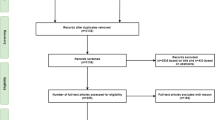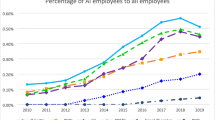Abstract
In light of the growing need to pay attention to general public opinions and sentiments toward AI, this paper examines the levels of understandings amongst the Australian public toward the increased societal use of AI technologies. Drawing on a nationally representative survey of 2019 adults across Australia, the paper examines how aware people consider themselves to be of recent developments in AI; variations in popular conceptions of what AI is; and the extent to which levels of support for AI are liable to alter with additional exposure to information about AI. While a majority of respondents consider themselves to have little knowledge and familiarity with the topic of AI, the survey nevertheless finds considerable range of relatively ‘plausible’ basic understandings of what AI is. Significantly, repeated questioning highlights a willingness among many people to reassess their opinions once having received further information about AI, and being asked to think through issues relating to AI and society. These patterns remain relatively consistent, regardless of respondents’ political orientation, income, social class and other demographic characteristics. As such, the paper concludes by considering how these findings provide support for the development of public education efforts to further enhance what might be termed ‘public understanding of AI’.




Similar content being viewed by others
Availability of data and material
Survey dataset is publicly available: https://doi.org/10.26180/13240619..
References
Adams E, Burall S (2019) How to stimulate effective public engagement on the ethics of artificial intelligence. Involve
Aoki N (2020) An experimental study of public trust in AI chatbots in the public sector. Gov Inf Q 37(4):101490
Balaram B, Greenham T, Leonard J (2018). Artificial intelligence: real public engagement. Royal Society of the Arts
Biemer P (2010) Total survey error: design, implementation, and evaluation. Public Opin Q 74(5):817–848
Bradford B, Yesberg J, Jackson J, Dawson P (2020) Live facial recognition: trust and legitimacy as predictors of public support for police use of new technology. Br J Criminol 60(6):1502–1522
Braithwaite V (2020) Beyond the bubble that is Robodebt: how governments that lose integrity threaten democracy. Aust J Soc Issues 55(3):242–259
Cave S, Coughlan K, Dihal K (2019) Scary robots: examining public responses to AI. In: Proceedings of the 2019 AAAI/ACM Conference on AI, Ethics, and Society. ACM, 331–337
Chandler J, Rosenzweig C, Moss A (2019) Online panels in social science research: expanding sampling methods beyond Mechanical Turk. Behav Res 51:2022–2038
Collins H, Evans R (2008) Rethinking expertise. University of Chicago Press, Chicago
Collins H, Pinch T (2014) The Golem at large. Cambridge University Press, Cambridge
Cui D, Wu F (2019) The influence of media use on public perceptions of artificial intelligence in China. Information Development. 0266666919893411
Dillon S, Collett C (2019) AI and gender: four proposals for future research. Leverhulme Centre for the Future of Intelligence
Fast E, Horvitz E (2017) Long-term trends in the public perception of artificial intelligence. In: 31st AAAI conference on Artificial Intelligence, San Francisco, February 4–9
Galanos V (2019) Exploring expanding expertise. Technol Anal Strateg Manag 31(4):421–432
Galloway K (2017) Big data: a case study of disruption and government power. Altern Law J 42(2):89–95
Gebru T (2020) Race and gender. In: Pasquale F, Dubber M, Das S (eds.)
Geirbo H (2017) Smart environments? Reflections on the role of metaphors in IS. Scandinavian Journal of Information Systems 29(2):art. 4
Giuliano R (2020) Echoes of myth and magic in the language of Artificial Intelligence. AI Soc 35:1009–1024
Guihot M, Matthew A, Suzor N (2017) Nudging robots: innovative solutions to regulate Artificial Intelligence. Vanderbilt J Entertain Technol Law 20(2):385–456
Huggins A (2019) We need human oversight of machine decisions to stop robo-debt drama. The Conversation, 2 July.
Hulse L, Xie H, Galea E (2018) Perceptions of autonomous vehicles. Saf Sci 102:1–13
Ipsos/MORI (2017) Public views of machine learning. Royal Society
James A, Whelan A (2021) ‘Ethical’ artificial intelligence in the welfare state: discourse and discrepancy in Australian social services. Crit Soc Policy. https://doi.org/10.1177/0261018320985463
Kanal L, Lemmer J (2014) Uncertainty in artificial intelligence. Elsevier, Amsterdam
Kelley P, Yang Y, Heldreth C, Moessner C, Sedley A, Kramm A, Woodruff A (2019) Happy and assured that life will be easy 10 years from now: perceptions of Artificial Intelligence in 8 countries. arXiv preprint. arXiv:2001.00081.
Krafft P, Young M, Katell M, Huang K, Bugingo G (2020) Defining AI in policy versus practice. In: Proceedings of the AAAI/ACM Conference on AI, Ethics, and Society, 72–78
Leetaru K (2019) Why is the public so AI-illiterate? Forbes
Leite I, Martinho C, Paiva A (2013) Social robots for long-term interaction: a survey. Int J Soc Robot 5(2):291–308
Licht K, Licht J (2020) Artificial intelligence, transparency, and public decision-making. AI Soc 35:917–926
Lobera J, Fernández Rodríguez C, Torres-Albero C (2020) Privacy, values and machines. Commun Stud 71(3):448–465
Lockey S, Gillespie N, Curtis C (2020) Trust in artificial intelligence: Australian insights 2020. KPMG
Long D, Magerko B (2020) What is AI literacy? In: Proceedings of the 2020 CHI Conference on Human Factors in Computing Systems, 1–16
Luccioni A, Bengio Y (2020) On the morality of Artificial Intelligence [Commentary]. IEEE Technol Soc Mag 39(1):16–25
Lupton D, Michael M (2017) ‘Depends on who’s got the data’: public understandings of personal digital dataveillance. Surveill Soc 15(2):254–268
Malka A, Lelkes Y, Soto C (2019) Are cultural and economic conservatism positively correlated? Brit J Polit Sci 49(3):1045–1069
Martin A, Donovan K (2015) New surveillance technologies and their publics. Public Underst Sci 24(7):842–857
McCorduck P (1979) Machines who think. Freeman
OECD (2019) Recommendation of the Council on Artificial Intelligence, OECD/LEGAL/0449 www.oecd.ai/ai-principles
Pacheco J, Maltby E (2017) The role of public opinion—does it influence the diffusion of ACA decisions? J Health Polit Policy Law 42(2):309–340
Peng Y (2020) The ideological divide in public perceptions of self-driving cars. Public Underst Sci 29(4):436–451
Ridley M, Pawlick-Potts D (2021) Algorithmic literacy and the role for libraries. ITAL. https://doi.org/10.6017/ital.v40i2.12963
Russell S, Norvig P (1995) Artificial intelligence: a modern approach. Prentice Hall
Serholt S (2018) Breakdowns in children’s interactions with a robotic tutor. Comput Human Behav 81:250–264
Sheppard J, Gray M (2017) Australians largely support science, but not all see the benefits. The Conversation
Smith T (2011) Refining the total survey error perspective. Int J Public Opinion Res 23(4):464–484
Taulli T (2020) Facial Recognition Bans: What Do They Mean For AI? Forbes. https://www.forbes.com/sites/tomtaulli/2020/06/13/facial-recognition-bans-what-do-they-mean-for-ai-artificial-intelligence
Tennant C, Stares S, Howard S (2019) Public discomfort at the prospect of autonomous vehicles. Transp Res Part F 64:98–118
Tomboulides D, Dooney J, Mcintyre L, Abbott T (2019) Strategies to inform the Swiss public on Artificial Intelligence. https://digitalcommons.wpi.edu/iqp-all/5583/
Tonkin C (2021) Robodebt was an AI ethics disaster. ACS Information Age. https://ia.acs.org.au/article/2021/robodebt-was-an-ai-ethics-disaster.html
Van Dijck J (2003) After the ‘two cultures’ toward a ‘(multi) cultural’ practice of science communication. Sci Commun 25(2):177–190
Vartiainen H, Toivonen T, Jormanainen I, Kahila J, Tedre M, Valtonen T (2021) Machine learning for middle schoolers. Int J Child-Comput Interact 29:100281
Wolf C, Joye D, Smith T, Fu Y (2016) The Sage handbook of survey methodology. SAGE, London
Wynne B (2014) Further disorientation in the hall of mirrors. Public Underst Sci 23(1):60–70
Yigitcanlar T, Kankanamge N, Regona M, Ruiz Maldonado A, Rowan B, Ryu A et al (2020) Artificial intelligence technologies and related urban planning and development concepts. JOItmC 6(4):187
Zhai Y, Yan J, Zhang H, Lu W (2020) Tracing the evolution of AI. IDD. https://doi.org/10.1108/IDD-01-2020-0007
Zhang B (2019) Public opinion lessons for AI regulation. Brookings Institute. www.brookings.edu/research/public-opinion-lessons-for-ai-regulation
Zhang B, Dafoe A (2019) Artificial intelligence: American attitudes and trends. available at SSRN 3312874
Zhou Y, Danks D (2020) ‘Different ‘intelligibility’ for different folks. In: Proceedings of the AAAI/ACM Conference on AI, Ethics, and Society, 194–199
Funding
This research was supported by a research grant from the Monash Data Futures Institute.
Author information
Authors and Affiliations
Contributions
Selwyn took primary responsibility for the writing of the introduction, methods, discussion and conclusions. Gallo Cordoba took primarily responsibility for the data analysis and presentation. Both contributed equally to the preparation of the paper.
Corresponding author
Ethics declarations
Conflict of interest
There is no conflict of interest to report.
Additional information
Publisher's Note
Springer Nature remains neutral with regard to jurisdictional claims in published maps and institutional affiliations.
Rights and permissions
About this article
Cite this article
Selwyn, N., Gallo Cordoba, B. Australian public understandings of artificial intelligence. AI & Soc 37, 1645–1662 (2022). https://doi.org/10.1007/s00146-021-01268-z
Received:
Accepted:
Published:
Issue Date:
DOI: https://doi.org/10.1007/s00146-021-01268-z




